外研版2017年中考一轮教材复习课件:八年级下册 Modules 1-3
文档属性
| 名称 | 外研版2017年中考一轮教材复习课件:八年级下册 Modules 1-3 | 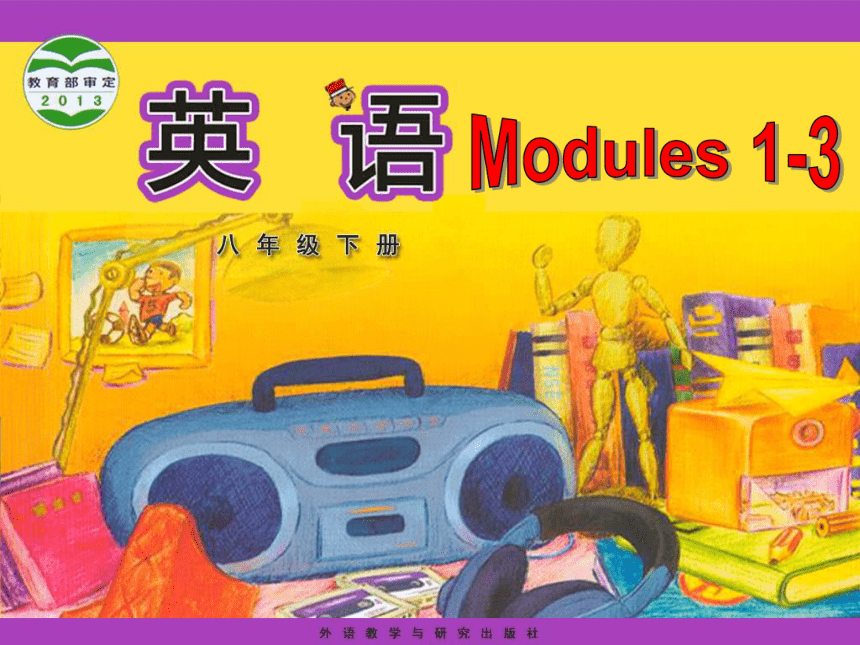 | |
| 格式 | zip | ||
| 文件大小 | 282.9KB | ||
| 资源类型 | 教案 | ||
| 版本资源 | 外研版 | ||
| 科目 | 英语 | ||
| 更新时间 | 2017-01-25 16:11:30 | ||
图片预览

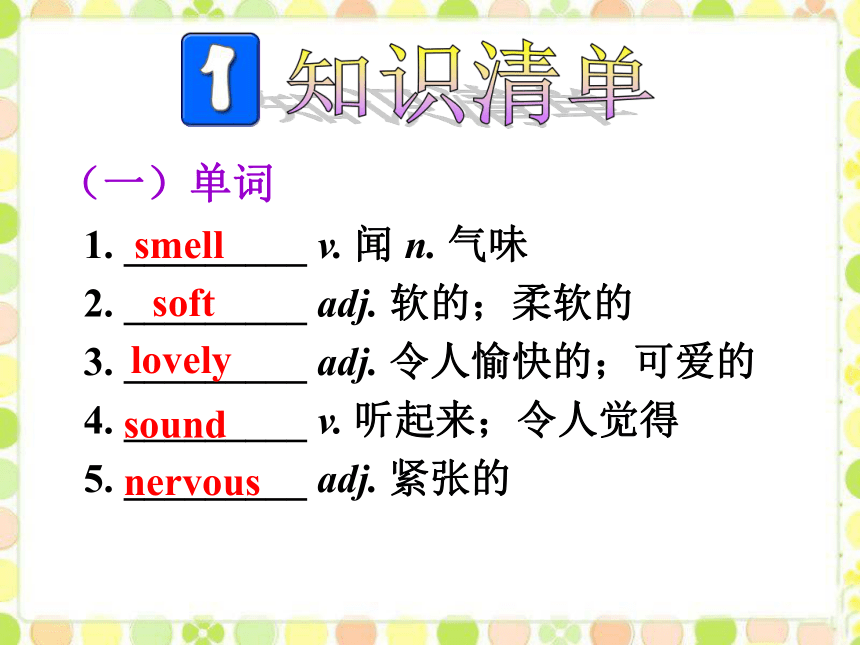
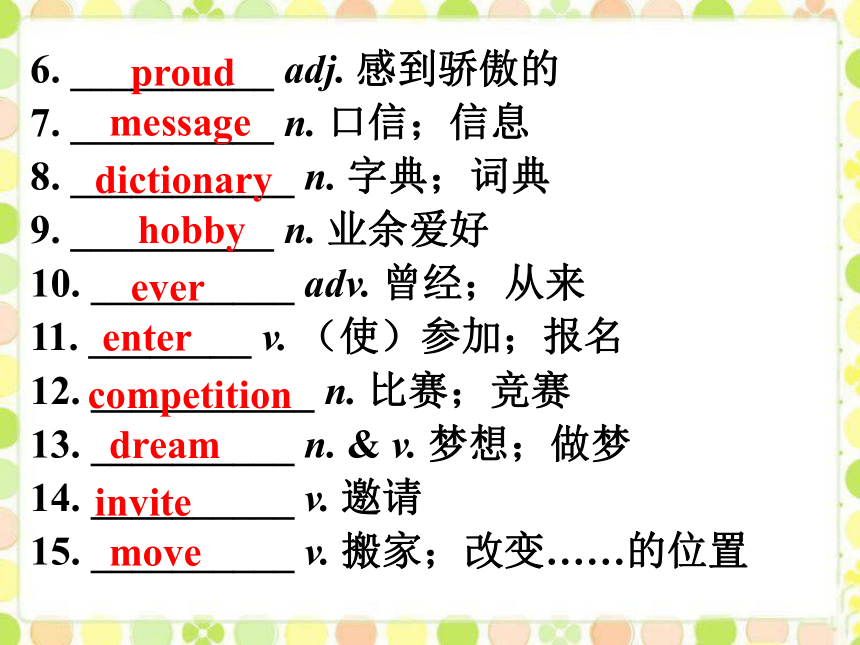
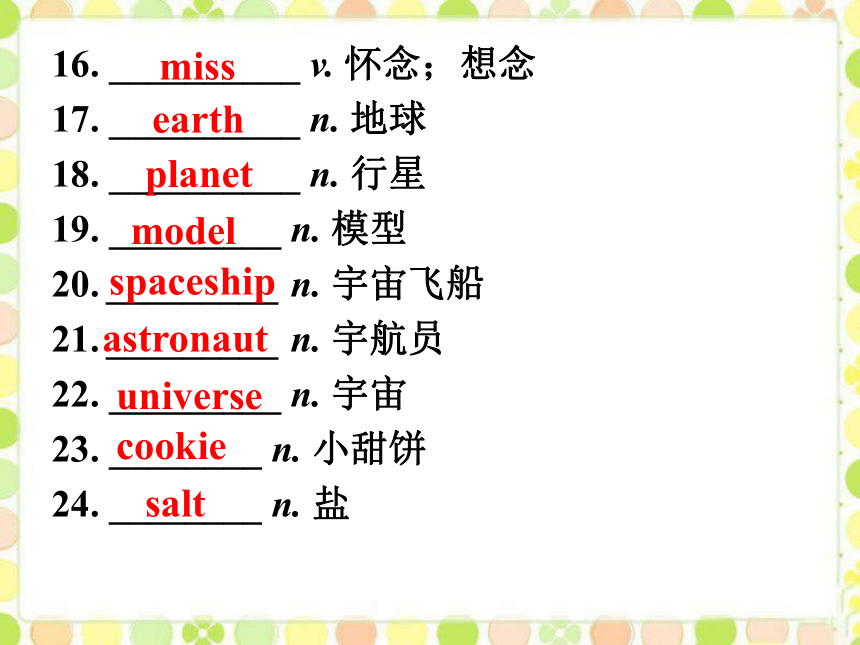
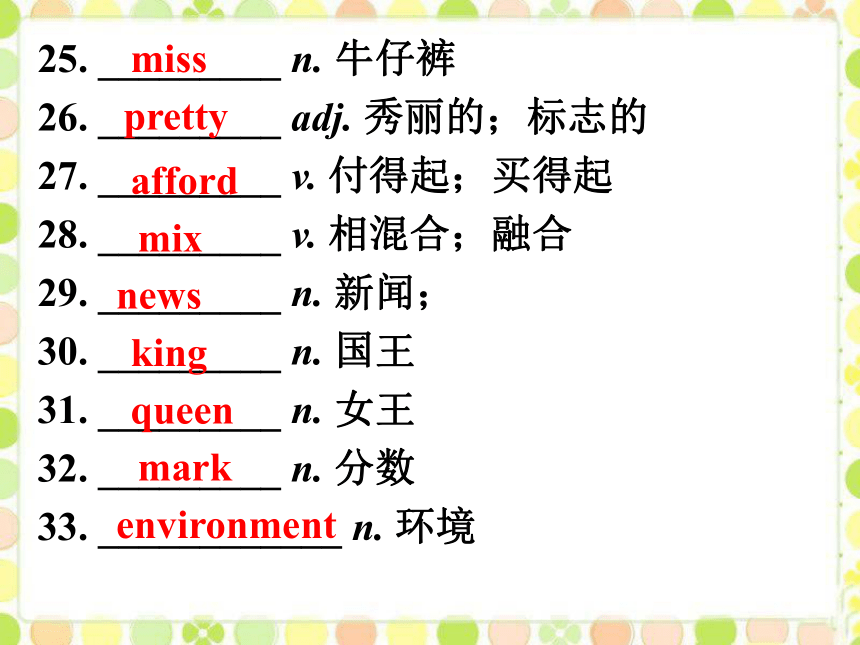
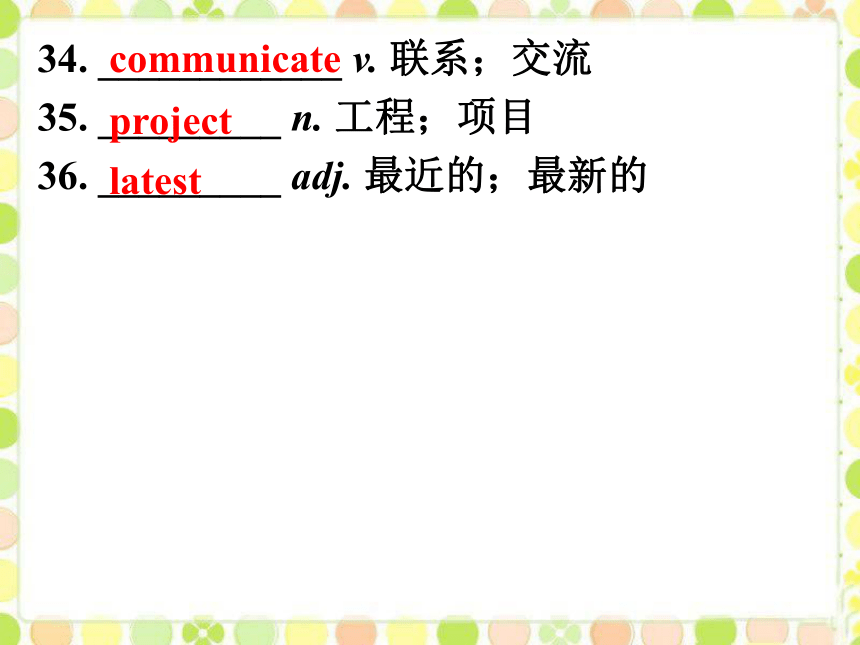
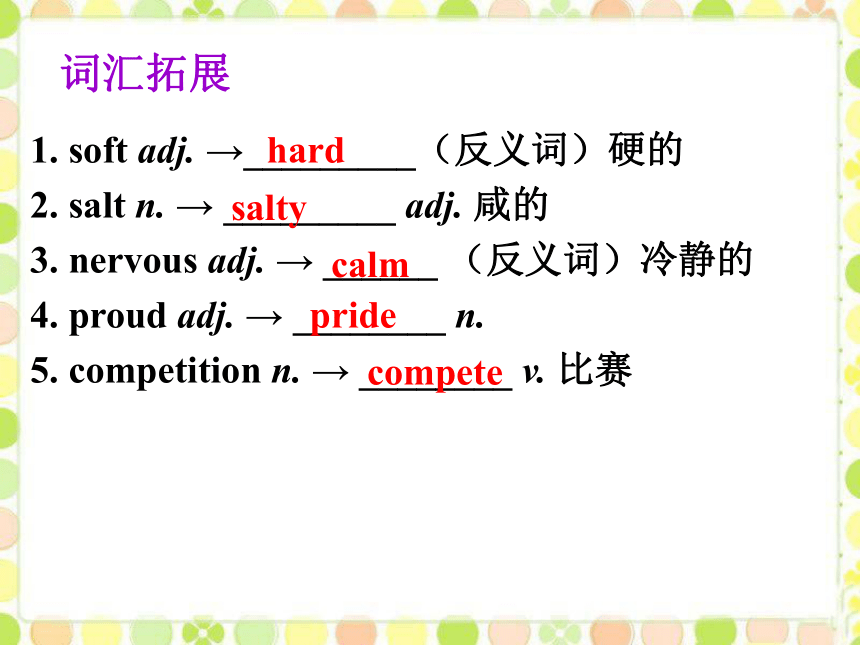
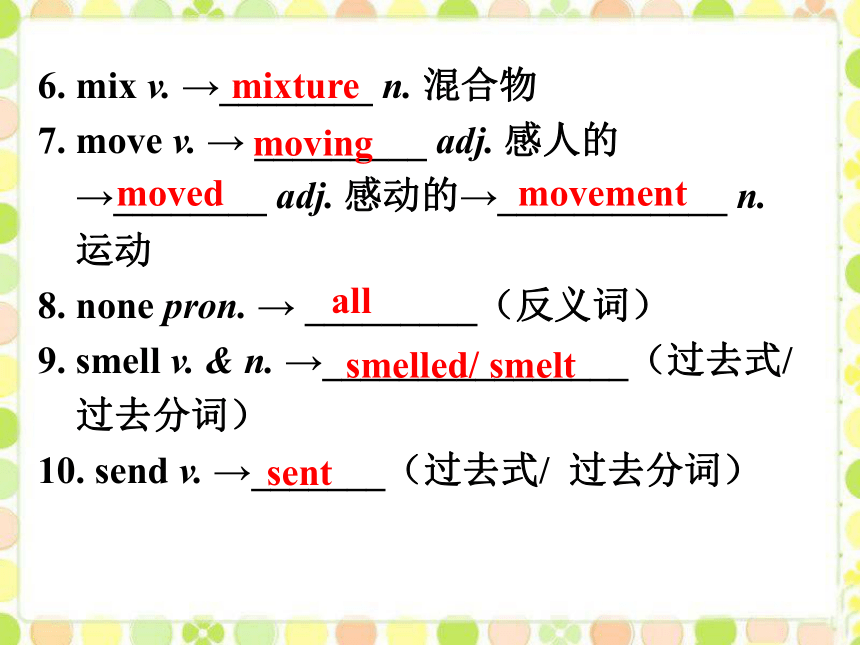
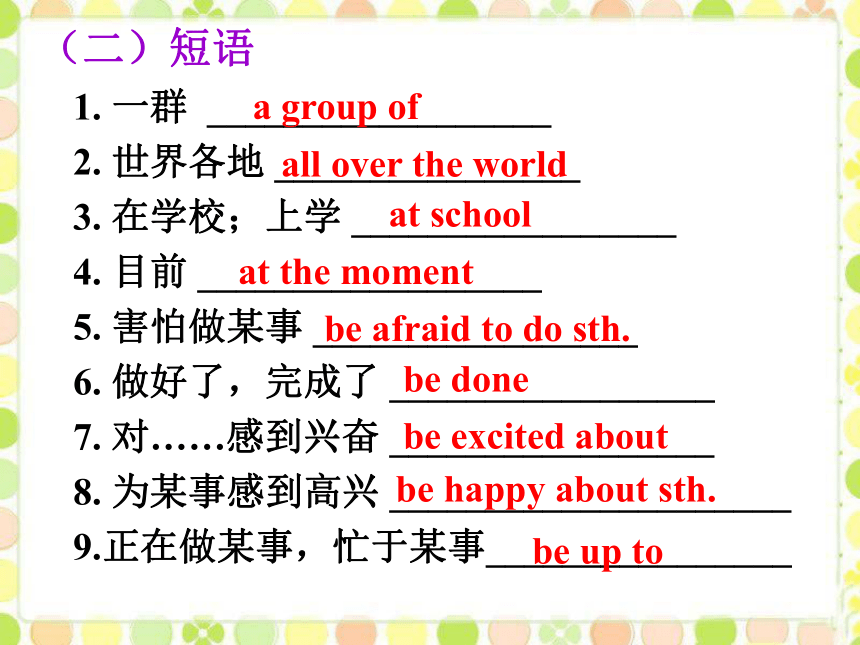
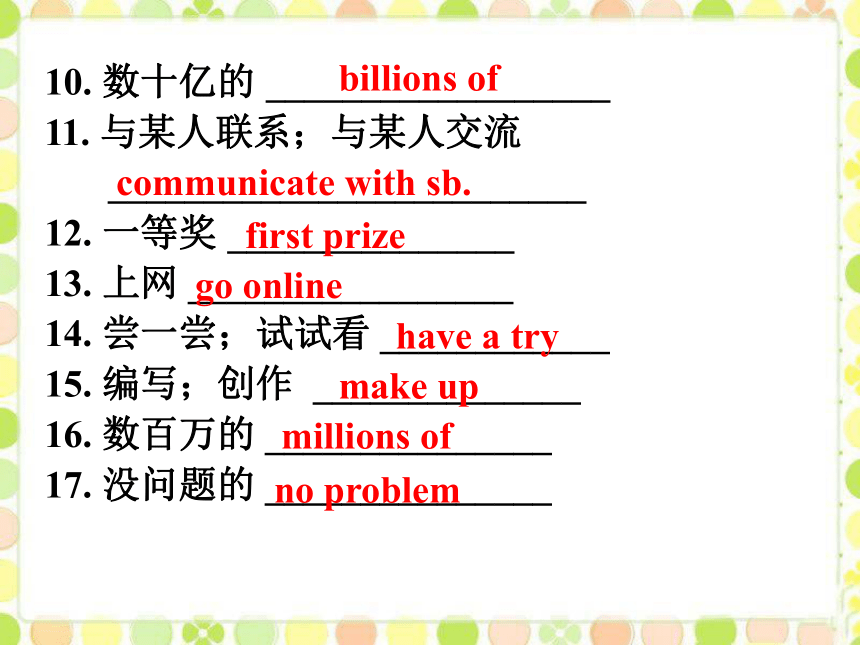
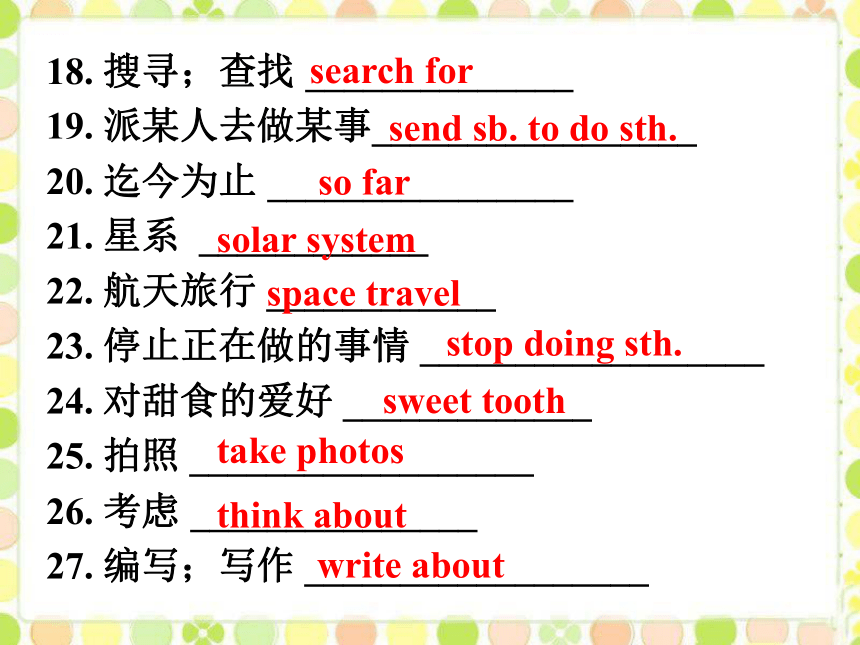

文档简介
课件63张PPT。Modules 1-31. _________ v. 闻 n. 气味
2. _________ adj. 软的;柔软的
3. _________ adj. 令人愉快的;可爱的
4. _________ v. 听起来;令人觉得
5. _________ adj. 紧张的smellsoftlovelysoundnervous(一)单词知识清单6. __________ adj. 感到骄傲的
7. __________ n. 口信;信息
8. ___________ n. 字典;词典
9. __________ n. 业余爱好
10. __________ adv. 曾经;从来
11. ________ v. (使)参加;报名
12. ___________ n. 比赛;竞赛
13. __________ n. & v. 梦想;做梦
14. __________ v. 邀请
15. __________ v. 搬家;改变……的位置prouddictionaryhobbyenterdreamcompetition messageeverinvitemove16. __________ v. 怀念;想念
17. __________ n. 地球
18. __________ n. 行星
19. _________ n. 模型
20. _________ n. 宇宙飞船
21. _________ n. 宇航员
22. _________ n. 宇宙
23. ________ n. 小甜饼
24. ________ n. 盐spaceshipuniversemissplanetmodelastronautearthcookiesalt25. _________ n. 牛仔裤
26. _________ adj. 秀丽的;标志的
27. _________ v. 付得起;买得起
28. _________ v. 相混合;融合
29. _________ n. 新闻;
30. _________ n. 国王
31. _________ n. 女王
32. _________ n. 分数
33. ____________ n. 环境affordmissprettymixnewskingqueenenvironmentmark34. ____________ v. 联系;交流
35. _________ n. 工程;项目
36. _________ adj. 最近的;最新的communicateprojectlatest词汇拓展1. soft adj. →_________(反义词)硬的
2. salt n. → _________ adj. 咸的
3. nervous adj. → ______ (反义词)冷静的
4. proud adj. → ________ n.
5. competition n. → ________ v. 比赛hardsaltycalmpridecompete6. mix v. →________ n. 混合物
7. move v. → _________ adj. 感人的
→________ adj. 感动的→____________ n.
运动
8. none pron. → _________(反义词)
9. smell v. & n. →________________(过去式/
过去分词)
10. send v. →_______(过去式/ 过去分词)smelled/ smeltmixturemovingmovedmovementallsent1. 一群 __________________
2. 世界各地 ________________
3. 在学校;上学 _________________
4. 目前 __________________
5. 害怕做某事 _________________
6. 做好了,完成了 _________________
7. 对……感到兴奋 _________________
8. 为某事感到高兴 _____________________
9.正在做某事,忙于某事________________(二)短语a group ofall over the worldat schoolat the momentbe afraid to do sth.be donebe excited aboutbe happy about sth.be up to10. 数十亿的 __________________
11. 与某人联系;与某人交流
_________________________
12. 一等奖 _______________
13. 上网 _________________
14. 尝一尝;试试看 ____________
15. 编写;创作 ______________
16. 数百万的 _______________
17. 没问题的 _______________billions offirst prizeno problemgo onlinemillions ofhave a trymake upcommunicate with sb. 18. 搜寻;查找 ______________
19. 派某人去做某事_________________
20. 迄今为止 ________________
21. 星系 ____________
22. 航天旅行 ____________
23. 停止正在做的事情 __________________
24. 对甜食的爱好 _____________
25. 拍照 __________________
26. 考虑 _______________
27. 编写;写作 __________________search forsend sb. to do sth.so farsolar systemspace travelstop doing sth.sweet toothtake photosthink aboutwrite about1. Would you like to try some?
你想尝一些吗?
2. I’m afraid I don’t like cheese.
恐怕我不喜欢奶酪。
3. Shall I get the sugar? 我来拿糖吧?
4. ... are you sure that’s sugar? ……你确定那是糖吗?
5. Thanks for your last message.
谢谢你上次发来的信息。(三)句型6. It was great to hear from you, and I can't
wait to meet you.
收到你的来信真是太好了,我迫不及待地
想见到你。
7. I spend a lot of time playing classical
music with my friends at school ...
我和朋友们在学校里花大量时间演奏古典
音乐。
8. ... I can't tell you how excited I am about
going to China!
但我无法向你表达去中国的兴奋心情!
9. Have you ever won any prizes before?
你以前曾经得过奖吗?10. That’s a pity. 真可惜。
11. They have been to many interesting
places.
他们去过很多有趣的地方。
12. ... they find it hard to spell and
pronounce the words.
……他们发现在单词的拼写和发音方面
很难。
13. What are you up to? 你在干什么呢?
14. That’s why it’s on the news.
那就是它会上新闻的原因。15. Lots of scientists are working hard in
order to send astronauts to Mars one day.
为了有一天将宇航员送往火星,许多科学家
正努力工作。
16. How can I get information on space travel?
我怎样能得到关于航天旅行的信息呢?
17. It is impossible to imagine.
无法想象。1. smell v. 有……的气味;闻;闻出 n. 气味
作连系动词,意为“闻起来”,接形容词或介词
短语作表语。
[拓展] 类似的的感官动词还有look, taste,
sound, feel。
2. try n. 尝试;努力
作名词,常构成短语have a try,意为“尝一
尝;试试看”。
作动词,“尝试;试图”,常见搭配:try one’s
best to do sth. “尽某人最大的努力做某事”。核心要点(一)单词[辨析] try to do sth.与try doing sth.
try to do sth. “尽力做某事”,强调动作,表示努力、设法去做,但还没实现,不强调结果。
try doing sth. “试着做某事”,表示抱着试试看的想法做某事。
3. glasses n. 眼镜
成双成对的东西一般用复数形式,如shorts,jeans。要表达“一副/条……”用“a pair of…”。
[拓展] glass作不可数名词,意为“玻璃”;用作可数名词时,意为“玻璃杯”。4. proud adj. 感到自豪的;感到骄傲的
be proud of为……感到自豪/ 骄傲, 与take pride
in同义。
5. enter v.(使)参加;(使)报名
enter意为“参加”, 与take part in意思接近。
[拓展] enter 还可以表示“进入”,相当于go/ come
into。
6. dream n. 梦;梦想 v. 做梦;梦到;梦想
dream of=dream about 梦见7. afford v. (有财力)买得起,付得起
后面常接名词、代词或不定式,但不能接v.-ing形式。afford to do sth. “负担得起做某事”。
注意:afford常与can, could等词连用,但多用于否定句和疑问句中。
8. invite v. 邀请
invite sb. to do sth. 邀请某人做某事
invite sb. to+地点 邀请某人到某地
[拓展] invitation n. 邀请9. send v. 派遣去;命令……去
send sb. to do sth. 派遣某人做某事
[拓展] send sb. to sp. 派某人去某地
send for 派人去叫
send sth. out 分发;散发
send还有“发出;寄出”的意思。
10. mix v. 相混合;融合
mix up 混合;混淆
mix together 混合在一起
mix with 和……混合11. miss v. 惦念;怀念;想念
miss作及物动词,意为“想念;惦念”,后接名词。
[拓展] 其他用法:
(1)作动词,还表示“错过”,后接v.-ing形式。
(2)Miss “小姐”。
Miss Green missed the last train, she felt sad and missed her parents a lot.
__________________________________________
__________________________________________格林小姐错过了最后一班火车,她感到很难过,非常思念她的父母。12. earth n. 地球
on the earth 在地球上
on earth 究竟;到底,一般放在特殊疑问词的后
面。
13. reach v. 到达;抵达
[辨析] reach,get to与arrive at/ in
(1)reach是及物动词,后面接地点名词。arrive at后接小地点,arrive in后接大地点。
(2)当所接地点时here, there, home等副词时,只用get和arrive, 后面不接to, at或in。14. yet adv. 还,尚(表示某事在某一时间尚未发生,但未来也许会发生)
yet用于否定句时,通常位于句末。
用于表示肯定疑问句时,意为“已经”。
15. latest adj. 最近的;最新的
[辨析] latest, late, later与lately
latest用作形容词,the latest news “最新消息”。
late用作形容词或副词,“迟的(地);晚的(地)”。be late for “做……迟到”。
later用作形容词或副词,意为“后来的,随后的”。lately用作副词,意为“最近;近来”。与recently可互换,通常用于现在完成时。
16. discover v. 发现;找到
[辨析] discover, find, find out与look for
(1) discover表示偶然或经过努力发现已存在而不为人知的事,多指发现事物、真理或错误。
(2) find “找到”,强调“寻找”的结果。
(3) find out“查明;弄明白”,是经过研究、计算、探询等获知。
(4) look for 表示“寻找”的过程和动作。1. Would you like to try some?
“Would you like…?”是用来询问对方意见,邀请或请求别人做某事的一种委婉表达句型。句中用some而不用any, 用something而不用anything。
[拓展] would like的常见搭配:
(1) would like sth. 想要某物
(2) would like to do sth. 想要做某事
(3) would like sb. to do sth. 想要某人做某事(二)句型2. I’m afraid I don’t like cheese.
afraid是形容词,“害怕的;担心的”。主要用法:
(1) be afraid of+ n./ pron./v.-ing “害怕做……”
(2) be afraid+that从句 “害怕……”
(3) be afraid to do sth. “(因)害怕(而不敢)做某事”。
(4) 在口语中经常使用“I’m afraid so”意为 “恐怕是这样”或“I’m afraid not”,意为“恐怕不是(这样)”。3. …are you sure that’s sugar?
sure用作形容词,“确信的;确定的”,在句中作表语。与sure相关的常见句型:
(1)be sure+that从句 确信……
(2)be sure to do sth. 一定/ 确信做某事
(3)be sure of/ about sb. (doing) sth. 对某
人/ (做)某事有把握4. Thanks for your last message.
“Thanks for…”固定句型,“因……而感谢”,for后接名词或v.-ing形式。
5. It was great to hear from you, and I can’t
wait to meet you.
hear from “收到……的来信”,后可接人,也可接地点,相当于“get/ receive a letter from…”。
[拓展]
(1) hear of “听说”,同义短语hear about。
(2)can’t wait to do sth. “迫不及待地要做某事”6. Have you ever won any prizes before?
(1)“Have/ Has +sb.+ 动词的过去分词+其他?”用于询问某人过去的经历。ever表示“曾经”,用来加强语气。
(2)before此处作副词,意为“以前”。before常与现在完成时连用,它可与一般过去时连用,通常位于句末。
[拓展] before还可做介词或连词,意为“在……之前”,表示时间、位置、顺序等。7. That’s a pity.
“That’s a pity”常用来表示对某事或某物感到惋惜,相当于“What a pity!”。
[拓展] pity的其他用法:It’s a pity to do sth.做某
事可惜;It’s a pity (that)… ……真可惜。
8. They have been to many interesting places.
have been to… “曾经去过……”, 表示说话者
已从某地回来。
(2) have been to后可接表示次数的名词(once,
twice, three times等),表示“去过某地几
次”。也可与just, never, ever等连用。8. …they find it hard to spell and pronounce
the words.
“find+it+n. / adj. + to do sth.” “觉得/ 认为/ 发现做某事……”。当不定式作find, think, feel, consider等动词的宾语,且有名词或形容词作宾语补足语时,常用it作形式宾语,此句型可与“find/ think/ feel/ consider+that从句”结构相互转换。9. What are you up to?
该句中的be up to常用在非正式场合中,表示“正在做……, 忙于……”。
[拓展] be up to sb. 由某人决定
10. That’s why it’s on the news.
(1)That’s why…“那就是……的原因”。
(2)why it’s on the news 在句中作表语,是表语从句,从句要用陈述语序。11. Lots of scientists are working hard in order to send astronauts to Mars one day.
in order to do sth. “为了做某事”,在句中作目的状语,否定形式in order not to do sth. “为了不做某事”。
[拓展] in order that 意为“为了……”, 引导状语从句,相当于so that, 不能位于句首。“in order that+从句”通常可与“in order to do sth.”互换。12. It is impossible to imagine.
句中it是形式主语,真正的主语是动词不定式to imagine。“It is +adj.+ (for sb.) to do sth.”意为“(对某人来说) 做某事是……的”。表示感觉和知觉的系动词语法?表示感觉和知觉的系动词主要有look, sound, smell, taste和feel,这五个词后面均可接形容词作表语,说明主语所处的状态,其意思分别为“看 / 听 / 闻 / 尝 / 摸起来……”。如:
The cloth feels very soft.
The soup tastes sweet. I like it. ?这些词后面也可接like短语,like后面常用名词。如:
They look like strawberries and taste like carrots.
You sound just like me!1. The new sweater I bought for my grandma
________ soft. She likes it very much.
A. looks ? ? ? ? ? ? ? ? ? ?B. smells ?????????????
C. tastes ? ? ? ? ? ? ? ? ? ?D. feels ?(2015 山东潍坊)
2. This kind of T-shirt looks ________ and sells
________ in the market.
A. nice; good??? ??????????????? B. well; well??
C. nice; well?? ?????????????????? D. good; nice
(2015 贵州安顺)【中考链接】DC3. TFBOYS’ songs ________ sweet and many of
us like listening to them.
A. sound?? ?? ???? B. feel?? ?????????????
C. taste?? ??????????D. look (2015 江苏盐城)
4. The meat on the plate ________ so delicious.
Let’s try it together.
A. smells? ???????????????????????B. sounds? ???
C. sees??? ???????????????????????? D. feels
(2015 山东青岛)AA5. The boy looked ________ because he didn't
pass his maths exam.
A. sad ? ? ? ? ? ? ? ? ? ? ? ? B. sadness ???
C. saddest ? ? ? ? ? ? ? ? ?D. sadly? (2015 广东广州)A现在完成时?结构
现在完成时由“助动词 have / has + 动词的过去分词”构成。
?用法
1. 表示过去发生或已经完成的动作对现在造成的影响或结果。常见的时态标志词有already, just, yet, ever, never, before, so far等。如:
We’ve just heard the news.
So far I’ve learned about 6, 000 English words. 2. 表示过去某一时间开始并一直持续到现在的动作或状态,该用法常适用于延续性动词。常见的时态标志词有since, for, “in the past / last + 时间段”等。
① since意为“自从……”,它既可作介词,也可作连词。作介词时,后接时间点,表示某事开始的时间;作连词时,引导时间状语从句,从句常用一般过去时。如:
Jim has been a soldier since 2011.?
My mother has lived in the city since she was a child.② for作介词,后接一段时间,表示一种状况已经持续了多长时间。如:
My aunt has already stayed in England for three years.
另外,对since和 for引导的时间状语提问时常用how long。如:
—How long have the astronauts worked on the
programme?
—Since ten years ago. / For ten years.注意:
1. 表示短暂意义的动词(如come,see等)在肯定句和一般疑问句中不能和表示一段时间的时间状语连用,但在否定句中可以。如:
Paul has come to our school for one week. (×)
Paul hasn't come to our school for one week. (√)
I haven't seen Jenny since last year. (√)2. 短暂性动词与表示延续状态的动词可以相互转化,常见的有leave → be away, die → be dead, finish → be over, borrow → keep, buy → have, move to → live in, catch a cold → have a cold, join → be in / be a member of ..., fall asleep → be asleep, marry → be married, come / arrive here → be here等。如:
I bought the book one week ago. → I have had the book for one week.
The old man died three years ago. → The old man has been dead for three years.3. have / has been to 和have / has gone to的区别
“have / has been to + 地点”表示“曾经去过某地”;“have / has gone to + 地点”表示“已经去某地了”。如:
I have been to America three times.
Linda isn’t in the office. She has gone to Shenzhen.1. Miss Brown, we ________ cleaning our
classroom. Can we go home now?
A. finish ? ? ? ? ? ? ? ? ? ? ? ? ? ? B. finishing?????
C. are finished???? ???????????? D. have finished
?(2015 广东广州)
2. Over fifty countries ________ the ALLB (亚
投行) so far.
A. joined???? ???????????????????? B. was joining???
C. had joined????? ???????????? D. have joined
?(2015 四川宜宾)【中考链接】DD3. —Amy, can we give away these soft toys? We
________ them for many years.
—Mom, but I want to keep the bear.
A. bought?????? ? ????????????????? B. had???? ??????
C. have bought ? ? ? ? ? ? ? ? ?D. have had
?(2015 湖北黄冈)
4. —Ben and Sue aren’t home, are they?
—No. They ________ to London on business.
A. have gone??????????????????????? B. go? ??
C. have been ? ? ? ? ? ? ? ? ? ? ? D. will go?
(2015 江西)DA5. Lei Feng ________ for many years, but his
spirit is still encouraging us.
A. died ? ? ? ? ? ? ? ? ? ? ? ? ? ? B. has died??????
C. was dead?????? ??????????? D. has been dead
?(2015 广东)D交际用语一、忧虑 (Worries)
What’s wrong?
What’s the matter?
Anything wrong?
What should we do?
Are you worried about your health?
二、责备与抱怨 (Blame and complaint)
What do you mean by doing so?
How could you do that?
Why didn’t you tell me the truth?
Why don’t you do something about it?A: Hi, Paul! (1) ________ Why not have a try?
B: OK! Oh! (2) ________????
A: This is Italian pizza.根据对话内容从方框中选择能填入空白处的最佳选项补全对话。DBB: Hmm. It tastes nice and a little sour. (3)
________
A: I put some tomatoes in it.
B: Good!
A: (4) ________
B: Yes, please. Oh, it’s very fresh and cool.ACA: I’m very happy you like the food. (5)
________
B: Thank you.
A: You're welcome.EⅠ. 根据语境从方框中选择恰当的单词填空,
有的需要变换形式。巩固练习glassesnervous model, glasses, stranger, sour, send, invite, ever, light, none, ancient, mix, nervous1. In order to see the blackboard clearly, I
have to wear a pair of ________.?
2. Ann is a shy girl, so she is very ________
when she speaks in public.? 3. The milk in the cup is ________. You can't
drink it.
4. Thanks for ________ me to your birthday
party, Mike.
5. Xi'an is a(n) ________ city with many
places of interest.
6. Nick, have you ________ been to the United
States before?sourinvitingancientevermodel, glasses, stranger, sour, send, invite, ever, light, none, ancient, mix, nervous7. The ________ in the room is too weak.
Please stop reading.?
8. The man has three children, but ________
of them lives with him.
9. Sam ________ many messages to his
friends with his mobile phone every day.
10. Mum warns me not to speak to ________
on the way to school.lightnonesentstrangersmodel, glasses, stranger, sour, send, invite, ever, light, none, ancient, mix, nervous11. My father bought a(n) ________ plane. It
was made in America.
12. If you ________ blue and yellow, you’ll
make green. modelmixmodel, glasses, stranger, sour, send, invite, ever, light, none, ancient, mix, nervousⅡ. 根据语境及所给首字母提示补全所缺单词。
1. I like acting. My d_____ is to become a
famous actor in the future.
2. Something is wrong with my grandmother's e____. She can’t hear at all.
3. Yesterday Tom entered the speaking
c___________ and won the first prize.
4. This house is too expensive. We can’t a______
it.??????
5. My parents aren’t at home. I m___ them a lot.
6. The e____ always goes round the sun.competitiondreamearsaffordmissearth7. Mr Wang r________ Beijing by train yesterday morning.
8. Her family m______ to New York last year because her father found a job there.
9. Look! A g_____ of children are dancing under the tree.
10. Work hard, and you can get good
m________ in the exams. movedreachedmarksgroup1. The English girl ______________ visiting
the Great Wall soon.?
2. The New Year’s Day is coming. Children
are ________________ the days.
3. My cousin has a ___________. He
often eats chocolate, sweets and ice cream.Ⅲ. 根据语境从方框中选择恰当的短语填空,有
的需要变换形式。counting downis excited aboutsweet tooth4. The dish looks nice. ________________.
5. Do you know how many stars there are in the
___________?
6. Some people are interested in
___________. They hope they will have a
chance to go into the space.
7. —Can you help me carry the heavy bag???
—________________.solar systemHave a tryspace travelNo problem8. Our class teacher is popular because she
often ________________ us.communicates withⅣ. 根据括号内所给英文提示语将下列句子翻译成英语。
1. 我们为你的成功而感到骄傲。 (be proud of)
_________________________________________
2. 谢谢你的书,它很有趣。? (thanks for sth.)
_________________________________________
3. 她在课堂上编了一个有趣的故事。 (make up)
_________________________________________
4. 你想让我们写些什么? (write about)
_________________________________________
5. 这些天你们在做什么呢? (be up to)
_________________________________________Thanks for your book. It’s very interesting.?What are you up to these days?We are proud of your success.She made up an interesting story in class.What do you want us to write about?
2. _________ adj. 软的;柔软的
3. _________ adj. 令人愉快的;可爱的
4. _________ v. 听起来;令人觉得
5. _________ adj. 紧张的smellsoftlovelysoundnervous(一)单词知识清单6. __________ adj. 感到骄傲的
7. __________ n. 口信;信息
8. ___________ n. 字典;词典
9. __________ n. 业余爱好
10. __________ adv. 曾经;从来
11. ________ v. (使)参加;报名
12. ___________ n. 比赛;竞赛
13. __________ n. & v. 梦想;做梦
14. __________ v. 邀请
15. __________ v. 搬家;改变……的位置prouddictionaryhobbyenterdreamcompetition messageeverinvitemove16. __________ v. 怀念;想念
17. __________ n. 地球
18. __________ n. 行星
19. _________ n. 模型
20. _________ n. 宇宙飞船
21. _________ n. 宇航员
22. _________ n. 宇宙
23. ________ n. 小甜饼
24. ________ n. 盐spaceshipuniversemissplanetmodelastronautearthcookiesalt25. _________ n. 牛仔裤
26. _________ adj. 秀丽的;标志的
27. _________ v. 付得起;买得起
28. _________ v. 相混合;融合
29. _________ n. 新闻;
30. _________ n. 国王
31. _________ n. 女王
32. _________ n. 分数
33. ____________ n. 环境affordmissprettymixnewskingqueenenvironmentmark34. ____________ v. 联系;交流
35. _________ n. 工程;项目
36. _________ adj. 最近的;最新的communicateprojectlatest词汇拓展1. soft adj. →_________(反义词)硬的
2. salt n. → _________ adj. 咸的
3. nervous adj. → ______ (反义词)冷静的
4. proud adj. → ________ n.
5. competition n. → ________ v. 比赛hardsaltycalmpridecompete6. mix v. →________ n. 混合物
7. move v. → _________ adj. 感人的
→________ adj. 感动的→____________ n.
运动
8. none pron. → _________(反义词)
9. smell v. & n. →________________(过去式/
过去分词)
10. send v. →_______(过去式/ 过去分词)smelled/ smeltmixturemovingmovedmovementallsent1. 一群 __________________
2. 世界各地 ________________
3. 在学校;上学 _________________
4. 目前 __________________
5. 害怕做某事 _________________
6. 做好了,完成了 _________________
7. 对……感到兴奋 _________________
8. 为某事感到高兴 _____________________
9.正在做某事,忙于某事________________(二)短语a group ofall over the worldat schoolat the momentbe afraid to do sth.be donebe excited aboutbe happy about sth.be up to10. 数十亿的 __________________
11. 与某人联系;与某人交流
_________________________
12. 一等奖 _______________
13. 上网 _________________
14. 尝一尝;试试看 ____________
15. 编写;创作 ______________
16. 数百万的 _______________
17. 没问题的 _______________billions offirst prizeno problemgo onlinemillions ofhave a trymake upcommunicate with sb. 18. 搜寻;查找 ______________
19. 派某人去做某事_________________
20. 迄今为止 ________________
21. 星系 ____________
22. 航天旅行 ____________
23. 停止正在做的事情 __________________
24. 对甜食的爱好 _____________
25. 拍照 __________________
26. 考虑 _______________
27. 编写;写作 __________________search forsend sb. to do sth.so farsolar systemspace travelstop doing sth.sweet toothtake photosthink aboutwrite about1. Would you like to try some?
你想尝一些吗?
2. I’m afraid I don’t like cheese.
恐怕我不喜欢奶酪。
3. Shall I get the sugar? 我来拿糖吧?
4. ... are you sure that’s sugar? ……你确定那是糖吗?
5. Thanks for your last message.
谢谢你上次发来的信息。(三)句型6. It was great to hear from you, and I can't
wait to meet you.
收到你的来信真是太好了,我迫不及待地
想见到你。
7. I spend a lot of time playing classical
music with my friends at school ...
我和朋友们在学校里花大量时间演奏古典
音乐。
8. ... I can't tell you how excited I am about
going to China!
但我无法向你表达去中国的兴奋心情!
9. Have you ever won any prizes before?
你以前曾经得过奖吗?10. That’s a pity. 真可惜。
11. They have been to many interesting
places.
他们去过很多有趣的地方。
12. ... they find it hard to spell and
pronounce the words.
……他们发现在单词的拼写和发音方面
很难。
13. What are you up to? 你在干什么呢?
14. That’s why it’s on the news.
那就是它会上新闻的原因。15. Lots of scientists are working hard in
order to send astronauts to Mars one day.
为了有一天将宇航员送往火星,许多科学家
正努力工作。
16. How can I get information on space travel?
我怎样能得到关于航天旅行的信息呢?
17. It is impossible to imagine.
无法想象。1. smell v. 有……的气味;闻;闻出 n. 气味
作连系动词,意为“闻起来”,接形容词或介词
短语作表语。
[拓展] 类似的的感官动词还有look, taste,
sound, feel。
2. try n. 尝试;努力
作名词,常构成短语have a try,意为“尝一
尝;试试看”。
作动词,“尝试;试图”,常见搭配:try one’s
best to do sth. “尽某人最大的努力做某事”。核心要点(一)单词[辨析] try to do sth.与try doing sth.
try to do sth. “尽力做某事”,强调动作,表示努力、设法去做,但还没实现,不强调结果。
try doing sth. “试着做某事”,表示抱着试试看的想法做某事。
3. glasses n. 眼镜
成双成对的东西一般用复数形式,如shorts,jeans。要表达“一副/条……”用“a pair of…”。
[拓展] glass作不可数名词,意为“玻璃”;用作可数名词时,意为“玻璃杯”。4. proud adj. 感到自豪的;感到骄傲的
be proud of为……感到自豪/ 骄傲, 与take pride
in同义。
5. enter v.(使)参加;(使)报名
enter意为“参加”, 与take part in意思接近。
[拓展] enter 还可以表示“进入”,相当于go/ come
into。
6. dream n. 梦;梦想 v. 做梦;梦到;梦想
dream of=dream about 梦见7. afford v. (有财力)买得起,付得起
后面常接名词、代词或不定式,但不能接v.-ing形式。afford to do sth. “负担得起做某事”。
注意:afford常与can, could等词连用,但多用于否定句和疑问句中。
8. invite v. 邀请
invite sb. to do sth. 邀请某人做某事
invite sb. to+地点 邀请某人到某地
[拓展] invitation n. 邀请9. send v. 派遣去;命令……去
send sb. to do sth. 派遣某人做某事
[拓展] send sb. to sp. 派某人去某地
send for 派人去叫
send sth. out 分发;散发
send还有“发出;寄出”的意思。
10. mix v. 相混合;融合
mix up 混合;混淆
mix together 混合在一起
mix with 和……混合11. miss v. 惦念;怀念;想念
miss作及物动词,意为“想念;惦念”,后接名词。
[拓展] 其他用法:
(1)作动词,还表示“错过”,后接v.-ing形式。
(2)Miss “小姐”。
Miss Green missed the last train, she felt sad and missed her parents a lot.
__________________________________________
__________________________________________格林小姐错过了最后一班火车,她感到很难过,非常思念她的父母。12. earth n. 地球
on the earth 在地球上
on earth 究竟;到底,一般放在特殊疑问词的后
面。
13. reach v. 到达;抵达
[辨析] reach,get to与arrive at/ in
(1)reach是及物动词,后面接地点名词。arrive at后接小地点,arrive in后接大地点。
(2)当所接地点时here, there, home等副词时,只用get和arrive, 后面不接to, at或in。14. yet adv. 还,尚(表示某事在某一时间尚未发生,但未来也许会发生)
yet用于否定句时,通常位于句末。
用于表示肯定疑问句时,意为“已经”。
15. latest adj. 最近的;最新的
[辨析] latest, late, later与lately
latest用作形容词,the latest news “最新消息”。
late用作形容词或副词,“迟的(地);晚的(地)”。be late for “做……迟到”。
later用作形容词或副词,意为“后来的,随后的”。lately用作副词,意为“最近;近来”。与recently可互换,通常用于现在完成时。
16. discover v. 发现;找到
[辨析] discover, find, find out与look for
(1) discover表示偶然或经过努力发现已存在而不为人知的事,多指发现事物、真理或错误。
(2) find “找到”,强调“寻找”的结果。
(3) find out“查明;弄明白”,是经过研究、计算、探询等获知。
(4) look for 表示“寻找”的过程和动作。1. Would you like to try some?
“Would you like…?”是用来询问对方意见,邀请或请求别人做某事的一种委婉表达句型。句中用some而不用any, 用something而不用anything。
[拓展] would like的常见搭配:
(1) would like sth. 想要某物
(2) would like to do sth. 想要做某事
(3) would like sb. to do sth. 想要某人做某事(二)句型2. I’m afraid I don’t like cheese.
afraid是形容词,“害怕的;担心的”。主要用法:
(1) be afraid of+ n./ pron./v.-ing “害怕做……”
(2) be afraid+that从句 “害怕……”
(3) be afraid to do sth. “(因)害怕(而不敢)做某事”。
(4) 在口语中经常使用“I’m afraid so”意为 “恐怕是这样”或“I’m afraid not”,意为“恐怕不是(这样)”。3. …are you sure that’s sugar?
sure用作形容词,“确信的;确定的”,在句中作表语。与sure相关的常见句型:
(1)be sure+that从句 确信……
(2)be sure to do sth. 一定/ 确信做某事
(3)be sure of/ about sb. (doing) sth. 对某
人/ (做)某事有把握4. Thanks for your last message.
“Thanks for…”固定句型,“因……而感谢”,for后接名词或v.-ing形式。
5. It was great to hear from you, and I can’t
wait to meet you.
hear from “收到……的来信”,后可接人,也可接地点,相当于“get/ receive a letter from…”。
[拓展]
(1) hear of “听说”,同义短语hear about。
(2)can’t wait to do sth. “迫不及待地要做某事”6. Have you ever won any prizes before?
(1)“Have/ Has +sb.+ 动词的过去分词+其他?”用于询问某人过去的经历。ever表示“曾经”,用来加强语气。
(2)before此处作副词,意为“以前”。before常与现在完成时连用,它可与一般过去时连用,通常位于句末。
[拓展] before还可做介词或连词,意为“在……之前”,表示时间、位置、顺序等。7. That’s a pity.
“That’s a pity”常用来表示对某事或某物感到惋惜,相当于“What a pity!”。
[拓展] pity的其他用法:It’s a pity to do sth.做某
事可惜;It’s a pity (that)… ……真可惜。
8. They have been to many interesting places.
have been to… “曾经去过……”, 表示说话者
已从某地回来。
(2) have been to后可接表示次数的名词(once,
twice, three times等),表示“去过某地几
次”。也可与just, never, ever等连用。8. …they find it hard to spell and pronounce
the words.
“find+it+n. / adj. + to do sth.” “觉得/ 认为/ 发现做某事……”。当不定式作find, think, feel, consider等动词的宾语,且有名词或形容词作宾语补足语时,常用it作形式宾语,此句型可与“find/ think/ feel/ consider+that从句”结构相互转换。9. What are you up to?
该句中的be up to常用在非正式场合中,表示“正在做……, 忙于……”。
[拓展] be up to sb. 由某人决定
10. That’s why it’s on the news.
(1)That’s why…“那就是……的原因”。
(2)why it’s on the news 在句中作表语,是表语从句,从句要用陈述语序。11. Lots of scientists are working hard in order to send astronauts to Mars one day.
in order to do sth. “为了做某事”,在句中作目的状语,否定形式in order not to do sth. “为了不做某事”。
[拓展] in order that 意为“为了……”, 引导状语从句,相当于so that, 不能位于句首。“in order that+从句”通常可与“in order to do sth.”互换。12. It is impossible to imagine.
句中it是形式主语,真正的主语是动词不定式to imagine。“It is +adj.+ (for sb.) to do sth.”意为“(对某人来说) 做某事是……的”。表示感觉和知觉的系动词语法?表示感觉和知觉的系动词主要有look, sound, smell, taste和feel,这五个词后面均可接形容词作表语,说明主语所处的状态,其意思分别为“看 / 听 / 闻 / 尝 / 摸起来……”。如:
The cloth feels very soft.
The soup tastes sweet. I like it. ?这些词后面也可接like短语,like后面常用名词。如:
They look like strawberries and taste like carrots.
You sound just like me!1. The new sweater I bought for my grandma
________ soft. She likes it very much.
A. looks ? ? ? ? ? ? ? ? ? ?B. smells ?????????????
C. tastes ? ? ? ? ? ? ? ? ? ?D. feels ?(2015 山东潍坊)
2. This kind of T-shirt looks ________ and sells
________ in the market.
A. nice; good??? ??????????????? B. well; well??
C. nice; well?? ?????????????????? D. good; nice
(2015 贵州安顺)【中考链接】DC3. TFBOYS’ songs ________ sweet and many of
us like listening to them.
A. sound?? ?? ???? B. feel?? ?????????????
C. taste?? ??????????D. look (2015 江苏盐城)
4. The meat on the plate ________ so delicious.
Let’s try it together.
A. smells? ???????????????????????B. sounds? ???
C. sees??? ???????????????????????? D. feels
(2015 山东青岛)AA5. The boy looked ________ because he didn't
pass his maths exam.
A. sad ? ? ? ? ? ? ? ? ? ? ? ? B. sadness ???
C. saddest ? ? ? ? ? ? ? ? ?D. sadly? (2015 广东广州)A现在完成时?结构
现在完成时由“助动词 have / has + 动词的过去分词”构成。
?用法
1. 表示过去发生或已经完成的动作对现在造成的影响或结果。常见的时态标志词有already, just, yet, ever, never, before, so far等。如:
We’ve just heard the news.
So far I’ve learned about 6, 000 English words. 2. 表示过去某一时间开始并一直持续到现在的动作或状态,该用法常适用于延续性动词。常见的时态标志词有since, for, “in the past / last + 时间段”等。
① since意为“自从……”,它既可作介词,也可作连词。作介词时,后接时间点,表示某事开始的时间;作连词时,引导时间状语从句,从句常用一般过去时。如:
Jim has been a soldier since 2011.?
My mother has lived in the city since she was a child.② for作介词,后接一段时间,表示一种状况已经持续了多长时间。如:
My aunt has already stayed in England for three years.
另外,对since和 for引导的时间状语提问时常用how long。如:
—How long have the astronauts worked on the
programme?
—Since ten years ago. / For ten years.注意:
1. 表示短暂意义的动词(如come,see等)在肯定句和一般疑问句中不能和表示一段时间的时间状语连用,但在否定句中可以。如:
Paul has come to our school for one week. (×)
Paul hasn't come to our school for one week. (√)
I haven't seen Jenny since last year. (√)2. 短暂性动词与表示延续状态的动词可以相互转化,常见的有leave → be away, die → be dead, finish → be over, borrow → keep, buy → have, move to → live in, catch a cold → have a cold, join → be in / be a member of ..., fall asleep → be asleep, marry → be married, come / arrive here → be here等。如:
I bought the book one week ago. → I have had the book for one week.
The old man died three years ago. → The old man has been dead for three years.3. have / has been to 和have / has gone to的区别
“have / has been to + 地点”表示“曾经去过某地”;“have / has gone to + 地点”表示“已经去某地了”。如:
I have been to America three times.
Linda isn’t in the office. She has gone to Shenzhen.1. Miss Brown, we ________ cleaning our
classroom. Can we go home now?
A. finish ? ? ? ? ? ? ? ? ? ? ? ? ? ? B. finishing?????
C. are finished???? ???????????? D. have finished
?(2015 广东广州)
2. Over fifty countries ________ the ALLB (亚
投行) so far.
A. joined???? ???????????????????? B. was joining???
C. had joined????? ???????????? D. have joined
?(2015 四川宜宾)【中考链接】DD3. —Amy, can we give away these soft toys? We
________ them for many years.
—Mom, but I want to keep the bear.
A. bought?????? ? ????????????????? B. had???? ??????
C. have bought ? ? ? ? ? ? ? ? ?D. have had
?(2015 湖北黄冈)
4. —Ben and Sue aren’t home, are they?
—No. They ________ to London on business.
A. have gone??????????????????????? B. go? ??
C. have been ? ? ? ? ? ? ? ? ? ? ? D. will go?
(2015 江西)DA5. Lei Feng ________ for many years, but his
spirit is still encouraging us.
A. died ? ? ? ? ? ? ? ? ? ? ? ? ? ? B. has died??????
C. was dead?????? ??????????? D. has been dead
?(2015 广东)D交际用语一、忧虑 (Worries)
What’s wrong?
What’s the matter?
Anything wrong?
What should we do?
Are you worried about your health?
二、责备与抱怨 (Blame and complaint)
What do you mean by doing so?
How could you do that?
Why didn’t you tell me the truth?
Why don’t you do something about it?A: Hi, Paul! (1) ________ Why not have a try?
B: OK! Oh! (2) ________????
A: This is Italian pizza.根据对话内容从方框中选择能填入空白处的最佳选项补全对话。DBB: Hmm. It tastes nice and a little sour. (3)
________
A: I put some tomatoes in it.
B: Good!
A: (4) ________
B: Yes, please. Oh, it’s very fresh and cool.ACA: I’m very happy you like the food. (5)
________
B: Thank you.
A: You're welcome.EⅠ. 根据语境从方框中选择恰当的单词填空,
有的需要变换形式。巩固练习glassesnervous model, glasses, stranger, sour, send, invite, ever, light, none, ancient, mix, nervous1. In order to see the blackboard clearly, I
have to wear a pair of ________.?
2. Ann is a shy girl, so she is very ________
when she speaks in public.? 3. The milk in the cup is ________. You can't
drink it.
4. Thanks for ________ me to your birthday
party, Mike.
5. Xi'an is a(n) ________ city with many
places of interest.
6. Nick, have you ________ been to the United
States before?sourinvitingancientevermodel, glasses, stranger, sour, send, invite, ever, light, none, ancient, mix, nervous7. The ________ in the room is too weak.
Please stop reading.?
8. The man has three children, but ________
of them lives with him.
9. Sam ________ many messages to his
friends with his mobile phone every day.
10. Mum warns me not to speak to ________
on the way to school.lightnonesentstrangersmodel, glasses, stranger, sour, send, invite, ever, light, none, ancient, mix, nervous11. My father bought a(n) ________ plane. It
was made in America.
12. If you ________ blue and yellow, you’ll
make green. modelmixmodel, glasses, stranger, sour, send, invite, ever, light, none, ancient, mix, nervousⅡ. 根据语境及所给首字母提示补全所缺单词。
1. I like acting. My d_____ is to become a
famous actor in the future.
2. Something is wrong with my grandmother's e____. She can’t hear at all.
3. Yesterday Tom entered the speaking
c___________ and won the first prize.
4. This house is too expensive. We can’t a______
it.??????
5. My parents aren’t at home. I m___ them a lot.
6. The e____ always goes round the sun.competitiondreamearsaffordmissearth7. Mr Wang r________ Beijing by train yesterday morning.
8. Her family m______ to New York last year because her father found a job there.
9. Look! A g_____ of children are dancing under the tree.
10. Work hard, and you can get good
m________ in the exams. movedreachedmarksgroup1. The English girl ______________ visiting
the Great Wall soon.?
2. The New Year’s Day is coming. Children
are ________________ the days.
3. My cousin has a ___________. He
often eats chocolate, sweets and ice cream.Ⅲ. 根据语境从方框中选择恰当的短语填空,有
的需要变换形式。counting downis excited aboutsweet tooth4. The dish looks nice. ________________.
5. Do you know how many stars there are in the
___________?
6. Some people are interested in
___________. They hope they will have a
chance to go into the space.
7. —Can you help me carry the heavy bag???
—________________.solar systemHave a tryspace travelNo problem8. Our class teacher is popular because she
often ________________ us.communicates withⅣ. 根据括号内所给英文提示语将下列句子翻译成英语。
1. 我们为你的成功而感到骄傲。 (be proud of)
_________________________________________
2. 谢谢你的书,它很有趣。? (thanks for sth.)
_________________________________________
3. 她在课堂上编了一个有趣的故事。 (make up)
_________________________________________
4. 你想让我们写些什么? (write about)
_________________________________________
5. 这些天你们在做什么呢? (be up to)
_________________________________________Thanks for your book. It’s very interesting.?What are you up to these days?We are proud of your success.She made up an interesting story in class.What do you want us to write about?
